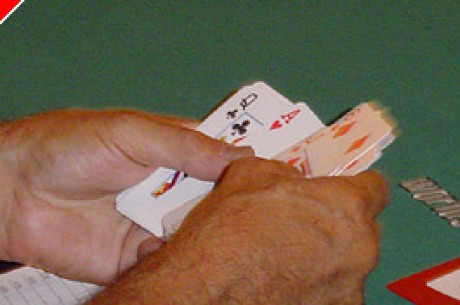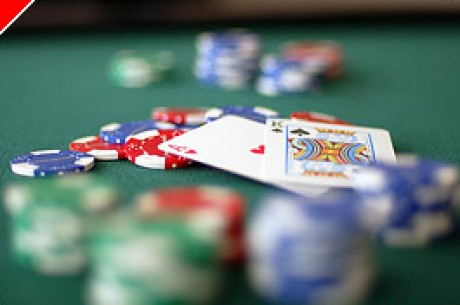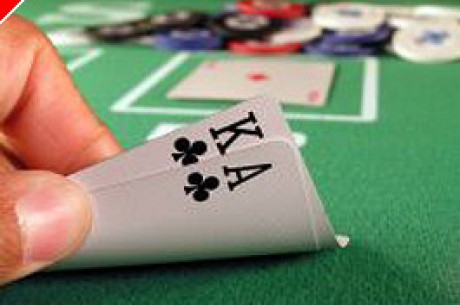Stud Poker Strategy: Stud in the Afternoon

It was a sunny summer day in Boston. There was a slight breeze. It was warm enough and clear enough to be a beach day. But I wanted to play poker more than I wanted to lie on the sand.
I had finished my work for the afternoon and left my office at 3:45. There were still another five hours of sunlight left. Still, I sought indoor activity.
I decided to drive down to Foxwoods. They had twenty-four hour stud action there. The good vibes of the day propelled me to competition. I couldn't resist the urge. I arrived at just after 5:00 PM. There was a seat in the $20/40 stud game. I saw four familiar faces. They must play every day, I thought. A couple of folks greeted me as I made my way in and then back to my safety deposit box. It was nice to be noticed.
I took out $1,000 from my box. That should be enough, I thought. If I lose this, I'm done, I thought. And then, a bit annoyed with myself, I added that this was too negative. I'll be back when I double or triple up, I concluded.
I went to the cashier and bought $700 in green chips and $300 in red ones. I carried my one rack over to the table, set the chips in front of my chair, took out my notebook and pen from the briefcase I had left on the chair, sat down, took my chips out of the rack, stacked them, put the rack under my chair, and got ready to play.
I watched the players as the dealer was dealing the end of the hand. The pot was not full. There were two players in on fifth street. "Check," one player said. "Check," answered the other.
The dealer deftly flipped each another card. The first player patted the table. The other player made a motion with two fingers indicating he wanted another card. The dealer interpreted it immediately as a check and dealt a final down card to each player.
The first player looked quickly at his card by flicking up the corner. "Um, I check," he said. The second player put his three down cards together, shuffled them together while holding them an inch or so off the table, brought them up close to his face and squeezed them apart very slowly. "OK. I check," he said.
The first player showed his hand --- nines and threes. The second player flicked his hand in the muck, evidently missing his draw.
This was great, I thought. A passive player and a squeezer. I was settled and ready for my first hand. I shoved out a $5 red chip. Everyone else anted. The dealer scooped in the white $1 chips from the other players, accurately tossed two in my direction, and then proceeded to deal the next hand.
I watched the other players as they were dealt their cards. A couple of the guys looked at their downcards before their upcard hit them. Most just waited for all three. A couple were in the habit of waiting until it was their turn before they looked at their down cards. I was one of them – most of the time. I saw the player with the 3♦ throw in a $5 bet. The 7♣ folded, then the Q♦ folded, then the K♣ called. It was up to me. I had (A♣ 7♦) Q♣. I immediately folded without a thought. I didn't pay any attention to the rest of the hands, as they folded in turn. Only the bring-in 3♦ and the K♣ who called the $5 forced bet were left.
I had so much energy that I just had to focus on something. So I carefully watched them play. Perhaps I could pick something up. At the very least I figured I'd try and put them each on a hand.
I figured that the player with the K♣, a guy whom I recognized and knew to be fairly straightforward (if somewhat looser than I), didn't have a pair of kings. He wasn't the type of player to slowplay on third into a full table. Had he a pair of kings or even a decent middle pair he would have raised that pot to $20. I figured he was on a flush draw or maybe he had J-Q-K, but I doubted that, also – there being two queens out. The bring-in 3♦ could have anything since no one raised him.
The dealer slid out the A♥ to the trey and a J♣ to the king.
The guy with the A-3 was unknown to me. He bet. I discounted his pair chances since I had had one of his aces. I figured he was betting just because he was high on board. There are some players who do that. It's "to them" so they feel compelled to bet, lest they show weakness and check. This is generally a bad play – since it soon becomes evident to the observant players – and they will hurt you with raises. Still, it's a common play.
The K♣ J♣ raised. This was a good ploy for two reasons. For one thing, it was a good defense against what might well have been a semi-bluff from the ace – if he had a pair and an ace kicker. Had the ace been betting with nothing or with two or three big cards, he might fold to a raise. But even if he didn't fold, the raise would probably either freeze the ace's betting on fifth street – giving the king another chance for a club if he was drawing to a flush, when the limits went up, or even get the ace to fold if he checked on fourth street with the high hand and the king bet.
The ace just called. I put him on garbage and the king on a flush draw.
On fifth street the A-3 drew a 5♥. The K-J drew a 9♠.
Sure enough, the ace checked. The king bet.
Surprisingly, the ace now check-raised. The king, uncharacteristically, rechecked his down cards. I thought that was very strange, since he was a good player and normally wouldn't do this – since rechecking down cards can give valuable information to an opponent. Nevertheless, this is what he did. He called the raise.
On sixth street the hands looked like this:
(x x) 3♦A♥5♥5♠
(x x) K♣J♣9♠6♣
The ace who had just caught a second five, giving him an exposed pair, checked again, being high with his pair of fives. The king bet. The ace raised again – another check-raise!
The king raised him back. This surprised me too. He must have hit his flush, I thought.
The ace immediately put in another raise. I figured that he might have been slowplaying a wheel on fifth street and did not believe that his opponent had just hit a flush or higher straight.
This caused the king to pause a long time. Finally, after what seemed like ten minutes but was probably closer to 15 seconds, he called. I figured that he might still be on a flush draw – or that he had drawn the flush but was afraid that his opponent had outdrawn him with a full house.
The dealer dealt the river card down. The ace bet. The king looked at his card quickly and with little apparent interest and called.
I was dying to see what they had. I figured the ace for some kind of weirdly hidden full house. Maybe he started with a pair of threes and a five? Maybe he started with rolled threes? I put the king on a high straight or a flush or both. I wasn't certain.
The first player turned over pocket fives, giving him quads! The next player, rolling his eyes, turned up a club flush.
I replayed the hand in my head as the dealer raked in the cards and the player with the quads raked in an enormous mound of red chips – over $600.
The guy with the quads got a free card on fourth street since he was the bring-in and wasn't raised on third. He got his pair of fives with an ace kicker and bet – an understandable ploy. But when the king raised him, he correctly called. The raise by the king made sense and so did his call. On fifth street he hit trips – well-concealed to be sure. He correctly went for and properly executed a check raise. The king should have checked behind him, since he was still on a draw. But sometimes players bet their four-flushes on fifth street, hoping to convince an opponent to fold – and to make the pot bigger. This, I think, is a mistake. When you raise on fourth street to get a free card on fifth you should generally give yourself the free card when it comes.
On sixth street, the king made his flush. It made sense for him to bet when the ace, now with an exposed pair of fives, bet. And, for the player with the fives, it surely made sense for him to check-raise, since he had quads. I would probably have bet the fives initially, looking for the King to raise me if in fact he hit his flush – and just call me if he didn't make it. In either case, I'd plan on making some extra money on sixth street. But the check-raised worked as well, since the king came over the top of the ace's check-raise. I'm not sure I would have made this move. What, after all, was the ace check-raising into a three-flush? He wouldn't do it with just trips would he? He wouldn't do it with just a wheel would he? Not if he thought about his opponent's hand – since it seemed fairly obvious that he might well have the flush. But sometimes players are so excited about hitting their hand that they fail to consider that their opponent may have just hit a bigger hand. So the check-raise-reraise sequence made sense, even if I disagreed with it. And of course the ace's final re-re-raise also made sense since he had quads and figured he must be the winner.
The river made sense as well, with a bet and call.
Poker in the afternoon had started out delightfully. I had already received a few poker lessons. And I hadn't even played a hand.








